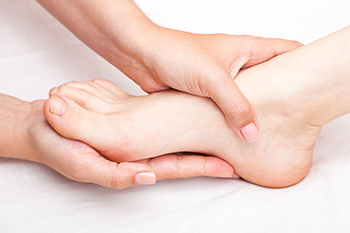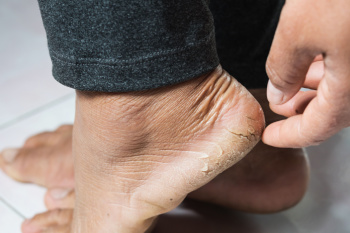
In the realm of foot health, a diverse array of conditions present, necessitating the expertise of a skilled podiatrist. Among these conditions is plantar fasciitis, a common ailment characterized by inflammation of the tissue connecting the heel bone to the toes, resulting in heel pain and discomfort. Bunions, another prevalent issue, manifest as bony bumps at the base of the big toe, often causing pain and difficulty with footwear. Hammertoes, a noticeable condition where toes become bent in abnormal positions, are also frequently addressed by podiatrists. Additionally, ingrown toenails, which occur when the edges of nails grow into the surrounding skin, are common foot disorders that podiatrists treat. Moreover, athletes frequently seek podiatric care for conditions such as Achilles tendonitis, an inflammation of the Achilles tendon, and stress fractures, which are tiny cracks in bones often caused by repetitive impact. From routine foot care to complex surgical interventions, podiatrists play a critical role in ensuring the health and mobility of their patients' feet and ankles. If you have any foot condition, it is strongly suggested that you schedule an appointment with a podiatrist who can accurately diagnose and offer a comprehensive treatment plan.
If you are experiencing pain in the feet or ankles, don’t join the stubborn majority refusing treatment. Feel free to contact one of our podiatrists from Lovely Foot Associates, PC. Our doctors can provide the care you need to keep you pain-free and on your feet.
What Is a Podiatrist?
Someone would seek the care of a podiatrist if they have suffered a foot injury or have common foot ailments such as heal spurs, bunions, arch problems, deformities, ingrown toenails, corns, foot and ankle problems, etc.
Podiatric Treatment
A podiatrist will treat the problematic areas of the feet, ankle or lower leg by prescribing the following:
A common podiatric procedure a podiatrist will use is a scanner or force plate which will allow the podiatrist to know the designs of orthotics. Patients are then told to follow a series of tasks to complete the treatment. The computer will scan the foot a see which areas show weight distribution and pressure points. The podiatrist will read the analysis and then determine which treatment plans are available.
If you have any questions please feel free to contact our office located in Johnstown, PA . We offer the newest diagnostic and treatment technologies for all your foot and ankle needs.

Cracked heels occur when the skin around the heels becomes dry, thickened, and fissured. This condition is often caused by a lack of moisture, leading to the skin's inability to retain hydration and elasticity. While anyone can develop cracked heels, some individuals are at a higher risk. Those who frequently expose their feet to harsh conditions, such as prolonged standing, walking barefoot, or wearing open-back shoes, are more susceptible. Additionally, factors like obesity, diabetes, and aging can contribute to the development of cracked heels. Symptoms of cracked heels include dryness, flakiness, redness, itching, and the formation of deep cracks or fissures. These fissures can be painful and may bleed in severe cases. It is essential to address cracked heels promptly to prevent complications such as infections. If you have developed cracked heels, it is strongly suggested that you consult a podiatrist who can provide the appropriate treatment methods.
Cracked heels are unsightly and can cause further damage to your shoes and feet. If you have any concerns, contact one of our podiatrists from Lovely Foot Associates, PC. Our doctors can provide the care you need to keep you pain-free and on your feet.
Cracked Heels
Cracked heels appear unappealing and can make it harder for you walk around in sandals. Aside from looking unpleasant, cracked heels can also tear stockings, socks, and wear out your shoes. There are several methods to help restore a cracked heel and prevent further damage.
How Do You Get Them?
Dry skin is the number one culprit in creating cracked heels. Many athletes, walkers, joggers, and even swimmers suffer from cracked heels. Age and skin oil production play a role to getting cracked heels as well.
Promote Healing
Over the counter medicines can help, especially for those that need instant relief or who suffer from chronic dry feet.
Wear Socks – Wearing socks with medicated creams helps lock in moisture.
Moisturizers – Applying both day and night will help alleviate dryness which causes cracking.
Pumice Stones – These exfoliate and remove dead skin, which allows for smoother moisturizer application and better absorption into the skin.
Change in Diet
Eating healthy with a well-balanced diet will give the skin a fresh and radiant look. Your body responds to the kinds of food you ingest. Omega-3 fatty acids and zinc supplements can also revitalize skin tissue.
Most importantly, seek professional help if unsure how to proceed in treating cracked heels. A podiatrist will help you with any questions or information needed.
If you have any questions, please feel free to contact our office located in Johnstown, PA . We offer the newest diagnostic and treatment technologies for all your foot care needs.

In the bustling environments of retail and hospitality, where long hours and constant movement are the norm, foot protection is essential for ensuring comfort, safety, and overall well-being. Retail and hospitality workers often spend extended periods on their feet, navigating various surfaces and environments throughout their shifts. Investing in appropriate footwear is vital to mitigate the risk of foot-related injuries and discomfort. Decide on shoes with slip-resistant soles to prevent slips and falls, particularly in areas prone to spills or moisture. Additionally, choose footwear with ample cushioning and arch support to reduce fatigue and alleviate strain on the feet and lower limbs. Consider the demands of the job when selecting footwear, opting for choices that provide adequate protection and durability without sacrificing comfort. Regularly inspect and maintain footwear to ensure its effectiveness in providing protection and support. If you have questions about what type of shoes to purchase for your workday that can provide adequate protection, it is suggested that you consult a podiatrist.
While working on the feet, it is important to take the proper care of them. For more information about working on your feet, contact one of our podiatrists from Lovely Foot Associates, PC. Our doctors will treat your foot and ankle needs.
Working on Your Feet
Standing on your feet for long periods of time can cause stress and pain in your feet. Your whole body may experience change in terms of posture, back pain, bunions, callouses and or plantar warts. There are ways to avoid these conditions with proper foot care, smart choices and correct posture.
Positive Changes
Negative heeled shoe – Choosing this shoe type places the heel slightly lower than the ball of the foot. These are great for overall foot health. Find shoes that fit you correctly.
Go barefoot – Our feet were not designed to be enclosed for all hours of the day. Try to periodically expose your feet to air.
Eliminate Pain
Foot Exercises – Performing simple exercises, incorporating yoga and doing stretches are beneficial. This will allow increased blood flow to the area and muscles of the foot.
Achilles tendon – Stretching the foot out flat on the floor will relax the calf muscles and tendon. These exercises can be performed almost anywhere. Make sure you add these exercises to your daily regimen.
With a little bit of this information and knowing more about foot health, you will notice changes. Foot stretches and proper footwear will help with pain and prevent further issues.
If you have any questions please feel free to contact our office located in Johnstown, PA . We offer the newest diagnostic and treatment technologies for all your foot and ankle needs.

Ballet, renowned for its grace and elegance, demands immense physical strength and flexibility, placing unique stresses on the feet of dancers. Foot pain is a common and often debilitating issue among ballet dancers, stemming from various factors. One primary cause is the repetitive strain endured during training and performances. The intricate footwork, including pointe work and jumps, can lead to overuse injuries such as stress fractures, tendonitis, and ligament strains. The demanding nature of ballet necessitates wearing tightly-fitted shoes, which can exacerbate foot discomfort and deformities like bunions and hammertoes over time. Poor technique or improper alignment during movements can also contribute to foot pain and injury. Additionally, anatomical factors such as foot structure and muscle imbalances play a significant role in predisposing dancers to foot problems. If you enjoy ballet dancing and are experiencing foot pain, it is suggested that you consult with a podiatrist who can offer you successful treatment methods in addition to effective prevention tips.
Foot Pain
Foot pain can be extremely painful and debilitating. If you have a foot pain, consult with one of our podiatrists from Lovely Foot Associates, PC. Our doctors will assess your condition and provide you with quality foot and ankle treatment.
Causes
Foot pain is a very broad condition that could be caused by one or more ailments. The most common include:
Diagnosis
To figure out the cause of foot pain, podiatrists utilize several different methods. This can range from simple visual inspections and sensation tests to X-rays and MRI scans. Prior medical history, family medical history, and any recent physical traumatic events will all be taken into consideration for a proper diagnosis.
Treatment
Treatment depends upon the cause of the foot pain. Whether it is resting, staying off the foot, or having surgery; podiatrists have a number of treatment options available for foot pain.
If you have any questions, please feel free to contact our office located in Johnstown, PA . We offer the newest diagnostic and treatment technologies for all your foot care needs.